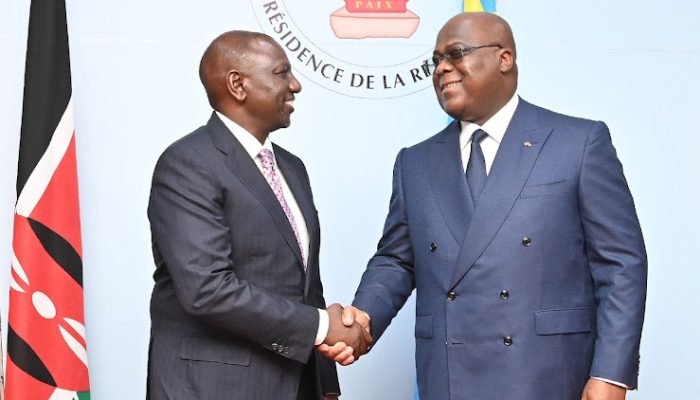The conflict in eastern Democratic Republic of Congo (DRC) has seen a significant escalation of tensions, particularly in light of the recent criticism from DRC President Félix Tshisekedi towards Kenyan President William Ruto. Tshisekedi has accused Ruto of mishandling the Nairobi Process, a peace initiative aimed at fostering dialogue and achieving disarmament among armed groups in the troubled region. This blog post delves into the complexities of the situation, exploring the criticisms, the history of the Nairobi Process, and the implications for regional stability.
The Nairobi Process: A Brief Overview
The Nairobi Process was initiated by former Kenyan President Uhuru Kenyatta with the aim of supporting disarmament and demobilization efforts in eastern DRC. This region has been plagued by conflict involving various armed groups, including the notorious M23 rebellion. The process was designed to bring these groups to the negotiating table, facilitating dialogue and ultimately paving the way for lasting peace.
Since its inception, the Nairobi Process has undergone several cycles of meetings. However, progress has been inconsistent, with notable stagnation following the third round of talks in December 2023. The recent criticism from Tshisekedi highlights the growing frustration within the DRC regarding the handling and effectiveness of this peace initiative.
Tshisekedi’s Criticism of Ruto
President Félix Tshisekedi has openly criticized his Kenyan counterpart, William Ruto, accusing him of taking sides with Rwanda, a move that Tshisekedi believes has severely undermined the Nairobi Process. This accusation is rooted in the complex geopolitical dynamics of the region, where Rwanda’s influence and alleged support for certain armed groups have long been a contentious issue.
Tshisekedi’s criticism underscores a broader dissatisfaction with the role of external actors in the conflict. He has expressed concerns that Ruto’s perceived partiality towards Rwanda has stalled progress, complicating efforts to achieve disarmament and peace in eastern DRC.
The Role of the East African Community (EAC)
The East African Community (EAC) has also come under scrutiny for its handling of the situation in eastern DRC. The EAC force, deployed to address the M23 rebellion, has been accused by Kinshasa of not taking sufficient action under its mandate. This perceived inaction has further strained relations between the DRC and its regional partners.
The dissatisfaction with the EAC’s efforts is compounded by Nairobi’s recent announcement of the creation of the Congo River Alliance (AFC), a political-military group linked to the M23. This development has been particularly alarming for the DRC government, which views the AFC as a destabilizing force.
The Congo River Alliance and Rising Tensions
The announcement of the Congo River Alliance (AFC) has added another layer of complexity to the conflict in eastern DRC. The AFC, reportedly linked to the M23, represents a significant challenge to peace efforts. Kenya’s refusal to arrest AFC leader Corneille Nangaa has further exacerbated tensions, prompting the DRC to recall its ambassadors to Kenya and the EAC for consultations.
This move signifies a deteriorating diplomatic relationship and highlights the urgency of addressing the underlying issues hindering the Nairobi Process. The presence of armed groups like the AFC complicates disarmament efforts, making it essential for regional actors to adopt a more unified and effective approach.
The Path Forward: Challenges and Opportunities
The criticism from Tshisekedi and the subsequent diplomatic fallout underscore the challenges facing the Nairobi Process and broader peace efforts in eastern DRC. For meaningful progress to be made, several key issues need to be addressed:
Impartial Mediation: Ensuring that mediators of the peace process remain impartial is crucial for building trust among all parties involved. Accusations of bias, such as those leveled by Tshisekedi against Ruto, undermine the credibility of the process and hinder dialogue.
Strengthening Regional Cooperation: The role of the EAC and other regional organizations is pivotal in resolving the conflict. Enhanced cooperation and a commitment to taking decisive action against armed groups are essential for creating a conducive environment for peace.
Addressing Root Causes: The conflict in eastern DRC is deeply rooted in historical, political, and economic issues. Comprehensive solutions that address these underlying causes are necessary for sustainable peace. This includes promoting economic development, ensuring fair resource distribution, and fostering political inclusion.
International Support: The international community has a vital role to play in supporting peace efforts. This includes providing funding for disarmament programs, offering technical assistance, and exerting diplomatic pressure on regional actors to adhere to peace agreements.
Conclusion
The conflict in eastern DRC is a complex and multifaceted issue that requires a coordinated and multifaceted response. President Félix Tshisekedi’s criticism of President William Ruto highlights the challenges and frustrations inherent in the peace process. However, it also presents an opportunity for regional and international actors to reassess their strategies and recommit to achieving lasting peace.
The Nairobi Process, despite its current setbacks, remains a critical framework for addressing the conflict. By ensuring impartial mediation, strengthening regional cooperation, addressing root causes, and garnering international support, there is hope for a resolution that brings stability and prosperity to the people of eastern DRC. The path forward may be fraught with challenges, but with concerted efforts and a renewed commitment to peace, a brighter future is within reach.




